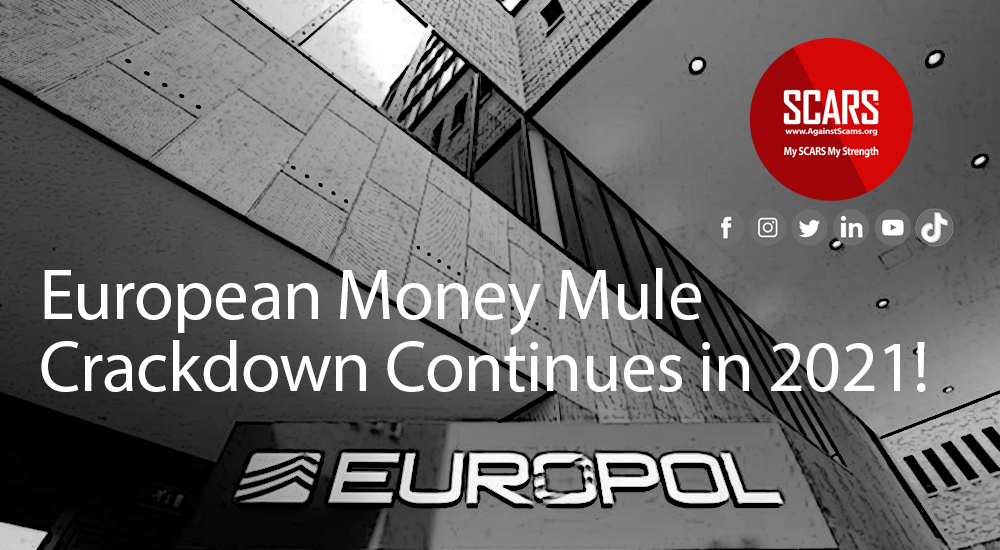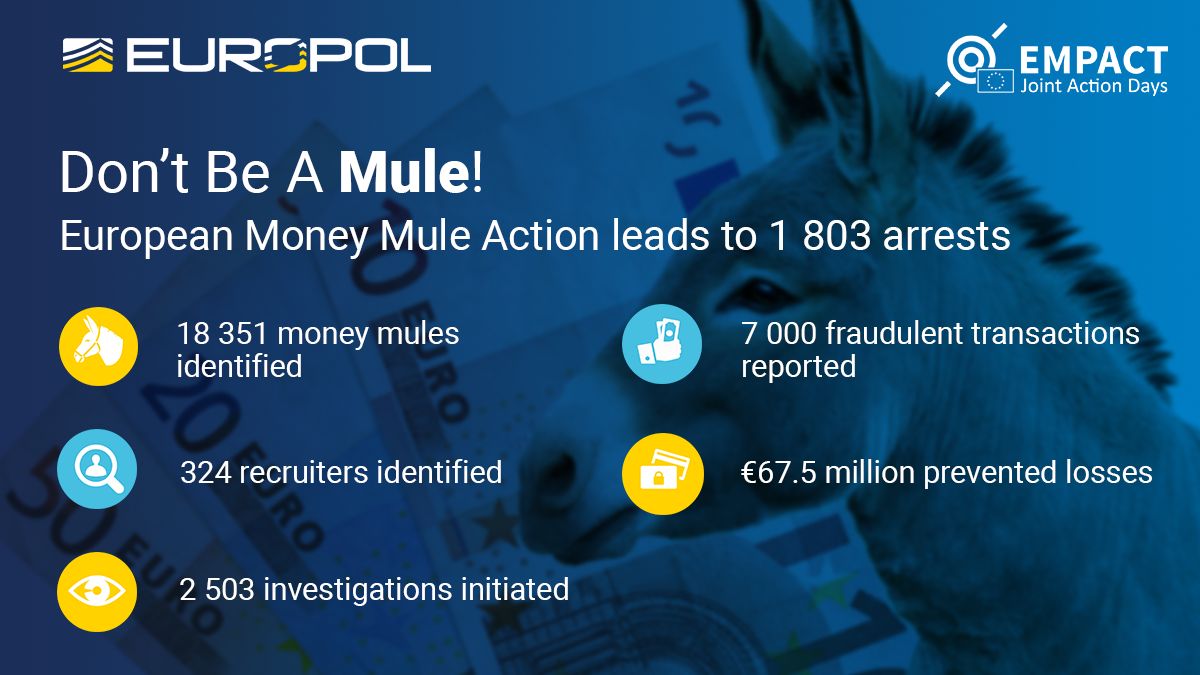
SCARS Institute’s Encyclopedia of Scams™ Published Continuously for 25 Years

European Money Mule Action Leads To 1,803 Arrests
International anti-money mule operation leads to 1,803 arrests & the identification of 18,000 money mules. The action was coordinated by Europol in cooperation with 27 countries across the globe, Eurojust, INTERPOL, the European Banking Federation, and the FinTech FinCrime Exchange.
Results From This Operation:
- 18,351 money mules identified
- 324 recruiters identified
- 1,803 arrested individuals
- 2,503 investigations initiated
- 7,000 fraudulent transactions reported
- €67.5 million prevented losses.
This was the 7th iteration of the European Money Mule Action, which is the largest international operation of its kind. It’s built around the idea that public-private information sharing is key to fighting complex modern crimes.
Investigation reveals money mules were laundering profits from online fraud schemes such as business email compromise and Forex scams.
Today saw the conclusion of the anti-money mule operation EMMA 7, an international action coordinated by Europol in cooperation with 27 countries, Eurojust, INTERPOL, the European Banking Federation (EBF), and the FinTech FinCrime Exchange. The operation resulted in 1,803 arrests and the identification of over 18 000 money mules. It also revealed that money mules were being used to launder money for a wide array of online scams such as sim-swapping, man-in-the-middle attacks, e-commerce fraud, and phishing.
Over roughly two and a half months of operations, EMMA 7 saw law enforcement, financial institutions, and the private sector, including Western Union, Microsoft, and Fourthline, cooperate in a concerted effort against money laundering in Europe, Asia, North America, Colombia, and Australia. As well as targeting the laundering of profits through money muling networks, investigators also sought intelligence on the sources of these illicit profits, shedding more light on the size and nature of the criminal economies that money mules serve.
Collaborating In The Fight On Money Laundering
This was the seventh iteration of the European Money Mule Action, or ‘EMMA’, which was established in 2016 on the initiative of Europol, Eurojust, and the European Banking Federation. It is the largest international operation of its kind, built around the idea that public-private information sharing is key to fighting complex modern crimes. Around 400 banks and financial institutions supported the action, reporting 7000 fraudulent transactions and preventing a total loss estimated at nearly €70 million.
EMMA 7 works based on private sector actors reporting incidences of suspicious or possibly illegal financial conduct to national law enforcement authorities. Similarly, law enforcement can ask financial actors to look into their own intelligence on potential money mules. With these inputs, law enforcement can paint a picture of laundering networks and then decide in each case how to react to the possible money muling activity.
EMMA provides a means for all these actors to confer, sharing intelligence that will help identify possible money mules and potentially lead to arrests. Europol supports each stage of the preparation by connecting the law enforcement partners and private sector partners and facilitating information exchange between them. In the operational phase, Europol provided analytical support that connected the transnational cases with the money muling networks behind them.
Most of the investigations under EMMA 7 focused on the international dimension of muling. Money muling operations see mules not only transferring money between countries but also traveling between countries themselves in order to set up bank accounts overseas. Criminals can then use these accounts later on in support of the money laundering process.
Awareness Is As Important As Action
The complexity of money muling operations, and law enforcement’s response to them, reflect how muling networks are created. Unlike many financial crimes, money mules can be recruited unknowingly into the criminal operation. The organized crime groups do this by preying on groups such as students, immigrants, and those in economic distress, offering easy money through legitimate-looking job adverts and social media posts.
Ignorance is not an excuse when it comes to the law and money muling; they are breaking the law by laundering the illicit proceeds of crime. For this reason, Europol coordinated the ‘#DontBeAMule’ awareness campaign with all participant countries, law enforcement, and the EBF on behalf of the European banks, as a means to prevent more innocent bystanders from being exploited by criminals and putting themselves at risk.
Eurojust participated in the operation via its dedicated liaison officer and stands ready to support cross-border investigations and judicial cooperation at the request of the national authorities involved.
EMMA is under the EMPACT Sub Priority Cybercrime NCPF (Non-Cash means of Payment Fraud), and is led by the Netherlands.
Participating countries: Australia, Austria, Belgium, Bulgaria, Colombia, Czech Republic, Estonia, Finland, Greece, Germany, Hong Kong-China, Hungary, Ireland, Italy, Moldova, Netherlands, Poland, Portugal, Romania, Singapore, Slovak Republic, Slovenia, Sweden, Switzerland, Spain, United Kingdom, United States.
Source: Europol
-/ 30 /-
What do you think about this?
Please share your thoughts in a comment below!
LEAVE A COMMENT?
Recent Comments
On Other Articles
- Arwyn Lautenschlager on Love Bombing And How Romance Scam Victims Are Forced To Feel: “I was love bombed to the point that I would do just about anything for the scammer(s). I was told…” Feb 11, 14:24
- on Dani Daniels (Kira Lee Orsag): Another Scammer’s Favorite: “You provide a valuable service! I wish more people knew about it!” Feb 10, 15:05
- on Danielle Delaunay/Danielle Genevieve – Stolen Identity/Stolen Photos – Impersonation Victim UPDATED 2024: “We highly recommend that you simply turn away form the scam and scammers, and focus on the development of a…” Feb 4, 19:47
- on The Art Of Deception: The Fundamental Principals Of Successful Deceptions – 2024: “I experienced many of the deceptive tactics that romance scammers use. I was told various stories of hardship and why…” Feb 4, 15:27
- on Danielle Delaunay/Danielle Genevieve – Stolen Identity/Stolen Photos – Impersonation Victim UPDATED 2024: “Yes, I’m in that exact situation also. “Danielle” has seriously scammed me for 3 years now. “She” (he) doesn’t know…” Feb 4, 14:58
- on An Essay on Justice and Money Recovery – 2026: “you are so right I accidentally clicked on online justice I signed an agreement for 12k upfront but cd only…” Feb 3, 08:16
- on The SCARS Institute Top 50 Celebrity Impersonation Scams – 2025: “Quora has had visits from scammers pretending to be Keanu Reeves and Paul McCartney in 2025 and 2026.” Jan 27, 17:45
- on Scam Victims Should Limit Their Exposure To Scam News & Scammer Photos: “I used to look at scammers photos all the time; however, I don’t feel the need to do it anymore.…” Jan 26, 23:19
- on After A Scam, No One Can Tell You How You Will React: “This article was very informative, my scams happened 5 years ago; however, l do remember several of those emotions and/or…” Jan 23, 17:17
- on Situational Awareness and How Trauma Makes Scam Victims Less Safe – 2024: “I need to be more observant and I am practicing situational awareness. I’m saving this article to remind me of…” Jan 21, 22:55
ARTICLE META
Important Information for New Scam Victims
- Please visit www.ScamVictimsSupport.org – a SCARS Website for New Scam Victims & Sextortion Victims
- Enroll in FREE SCARS Scam Survivor’s School now at www.SCARSeducation.org
- Please visit www.ScamPsychology.org – to more fully understand the psychological concepts involved in scams and scam victim recovery
If you are looking for local trauma counselors please visit counseling.AgainstScams.org or join SCARS for our counseling/therapy benefit: membership.AgainstScams.org
If you need to speak with someone now, you can dial 988 or find phone numbers for crisis hotlines all around the world here: www.opencounseling.com/suicide-hotlines
A Note About Labeling!
We often use the term ‘scam victim’ in our articles, but this is a convenience to help those searching for information in search engines like Google. It is just a convenience and has no deeper meaning. If you have come through such an experience, YOU are a Survivor! It was not your fault. You are not alone! Axios!
A Question of Trust
At the SCARS Institute, we invite you to do your own research on the topics we speak about and publish, Our team investigates the subject being discussed, especially when it comes to understanding the scam victims-survivors experience. You can do Google searches but in many cases, you will have to wade through scientific papers and studies. However, remember that biases and perspectives matter and influence the outcome. Regardless, we encourage you to explore these topics as thoroughly as you can for your own awareness.
Statement About Victim Blaming
SCARS Institute articles examine different aspects of the scam victim experience, as well as those who may have been secondary victims. This work focuses on understanding victimization through the science of victimology, including common psychological and behavioral responses. The purpose is to help victims and survivors understand why these crimes occurred, reduce shame and self-blame, strengthen recovery programs and victim opportunities, and lower the risk of future victimization.
At times, these discussions may sound uncomfortable, overwhelming, or may be mistaken for blame. They are not. Scam victims are never blamed. Our goal is to explain the mechanisms of deception and the human responses that scammers exploit, and the processes that occur after the scam ends, so victims can better understand what happened to them and why it felt convincing at the time, and what the path looks like going forward.
Articles that address the psychology, neurology, physiology, and other characteristics of scams and the victim experience recognize that all people share cognitive and emotional traits that can be manipulated under the right conditions. These characteristics are not flaws. They are normal human functions that criminals deliberately exploit. Victims typically have little awareness of these mechanisms while a scam is unfolding and a very limited ability to control them. Awareness often comes only after the harm has occurred.
By explaining these processes, these articles help victims make sense of their experiences, understand common post-scam reactions, and identify ways to protect themselves moving forward. This knowledge supports recovery by replacing confusion and self-blame with clarity, context, and self-compassion.
Additional educational material on these topics is available at ScamPsychology.org – ScamsNOW.com and other SCARS Institute websites.
Psychology Disclaimer:
All articles about psychology and the human brain on this website are for information & education only
The information provided in this article is intended for educational and self-help purposes only and should not be construed as a substitute for professional therapy or counseling.
While any self-help techniques outlined herein may be beneficial for scam victims seeking to recover from their experience and move towards recovery, it is important to consult with a qualified mental health professional before initiating any course of action. Each individual’s experience and needs are unique, and what works for one person may not be suitable for another.
Additionally, any approach may not be appropriate for individuals with certain pre-existing mental health conditions or trauma histories. It is advisable to seek guidance from a licensed therapist or counselor who can provide personalized support, guidance, and treatment tailored to your specific needs.
If you are experiencing significant distress or emotional difficulties related to a scam or other traumatic event, please consult your doctor or mental health provider for appropriate care and support.
Also read our SCARS Institute Statement about Professional Care for Scam Victims – click here to go to our ScamsNOW.com website.

















Thank you for your comment. You may receive an email to follow up. We never share your data with marketers.